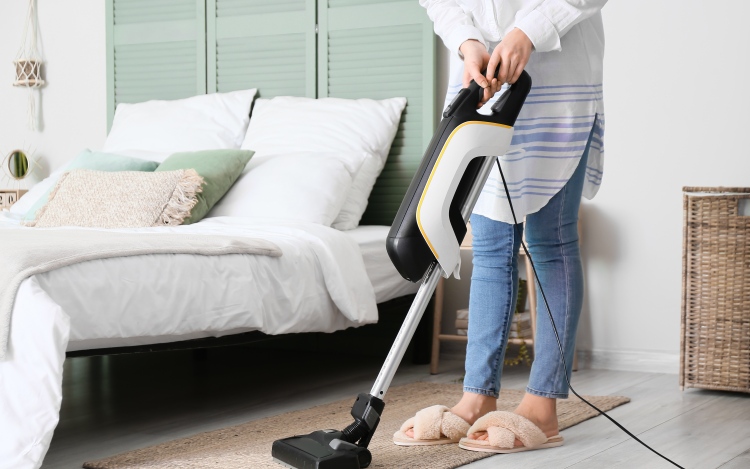When it comes to keeping your house clean, a vacuum is an indispensable tool. In our modern day, there are many options to choose from. Central vac systems and regular vacuums are two popular options for keeping your home clean. Both have their advantages, but which one is right for you? When considering a central vacuum system versus a regular vacuum cleaner, there are several key factors to consider.
What is Central Vac?
Central vac systems are a convenient and efficient way to keep your home clean. Central vacs consist of several components, including an inlet valve, power unit, and hose assembly. The power unit is usually installed in a garage or basement, while the inlet valve is placed near or in the rooms you want to vacuum. The hose assembly connects the power unit to the inlet valve, allowing you to vacuum without having to drag a heavy machine from room to room. This system eliminates the need for multiple vacuum cleaners and makes it easier to clean hard-to-reach places.
But is it perfect? Here, we compare both traditional vacuums and central vac so you can get a better understanding of both.
Features
Central vac systems typically have more powerful motors and larger capacity collections bags, allowing them to endure longer use and clean more deeply. Regular vacuum cleaners are generally easier to maneuver because they’re smaller and lighter. Both systems also come with a variety of heads and brushes for a variety of uses.
Keep in mind that neither system is perfect when it comes to pulling and pushing a device. While you need to bring a vacuum cleaner with you as you clean, you will have to manage the long hose of a central vac system as well. Both can be cumbersome at times and difficult to maneuver depending on the size of your home, as well as the space you are cleaning.
Central vac hoses come in a variety of lengths, depending on your needs. Longer hoses can reach difficult corners and crevices, while shorter ones are easier to store away when not in use. When it comes to size and weight, different vacuum cleaners offer a variety of options, so be sure to gauge your needs and your capabilities with whatever system you have in mind.
Installation
The cost of installation is another important factor when evaluating central vac versus regular vacuums. Central vac systems require physical work, as well as an installation technician for an initial installation, and can be pricier. On the other hand, regular vacuum cleaners do not require an extensive installation process, making them a more economical choice for those on a budget. While you can walk out of a store with a brand new vacuum, you can’t do the same with a central vac system.
Keep in mind that before you can have a central vac system installed, you will need to have an inspection. A licensed HVAC technician, such as a helpful technician at Environmental Air Systems Inc., can run a full, real-estate worthy inspection of your home to see if you are a good fit for the system.
Noise
Additionally, noise is another important factor to consider when comparing central vac and regular vacuums. Central vac is generally much quieter due to the fact that the motor is located in a separate space away from the living area. Regular vacuum cleaners, on the other hand, can be quite loud and may not be ideal if you have young children or pets. Keep in mind that there are some units that are louder than others, so shopping around for a quiet vacuum cleaner is also an option.
One of the best ways to dampen vacuum noise is to create a barrier between the appliance and your living area. You can do this by placing a blanket or carpet over the device, which will help absorb some of the sound waves produced by the vacuum cleaner. Additionally, you can place furniture and other items around the vacuum cleaner to further reduce the noise level. Another alternative, as mentioned, is to buy a quieter vacuum cleaner with specially designed noise dampening features, such as an anti-vibration system or soundproof foam padding. Finally, make sure that the filter and hose of your vacuum is clean so that air can pass through more easily, producing less sound as it does. Cleaning your vacuum regularly can also help reduce the noise it produces.
Maintenance
In terms of maintenance costs, regular vacuums are typically cheaper to maintain than central vac systems. This is mainly because regular vacuums do not need to be installed and can usually be replaced more easily than a central vac system. Both systems will require you to clean out their housing systems from time to time, as well as cleaning out any rollers or wheels of hair or debris.
No matter which system you choose, when it comes to cleaning out your system, the best thing you can do is to start with a detailed inspection. Look for clogs in hoses and other areas that could be preventing airflow. Also, make sure any filters are clean to avoid impairing suction. Regularly replace vacuum bags or containers if applicable for optimal efficiency. Check that the roller is clean and free of hair or debris; you may need to use a pair of scissors or a knife to cut away any stubborn clogs in the roller bristles.
Ultimately, the decision between a central vac system and regular vacuum cleaners comes down to personal preference and budget. Central vac systems are great for larger homes that need deep cleaning because of their powerful motors and increased capacity. On the other hand, regular vacuum cleaners are ideal for smaller homes or those on a budget because of their lower installation costs and easier maintenance. Whichever option you choose, it’s important to take the time to compare features and characteristics so you can make an informed decision.
By looking at each option carefully you can make the best decision for your home and budget. The goal is to find a vacuum that meets your individual needs while staying within your budget. With careful research and consideration of all the options available, you’ll be able to find a vacuum that is perfect for your home.
Tuesday 25 November 2025




